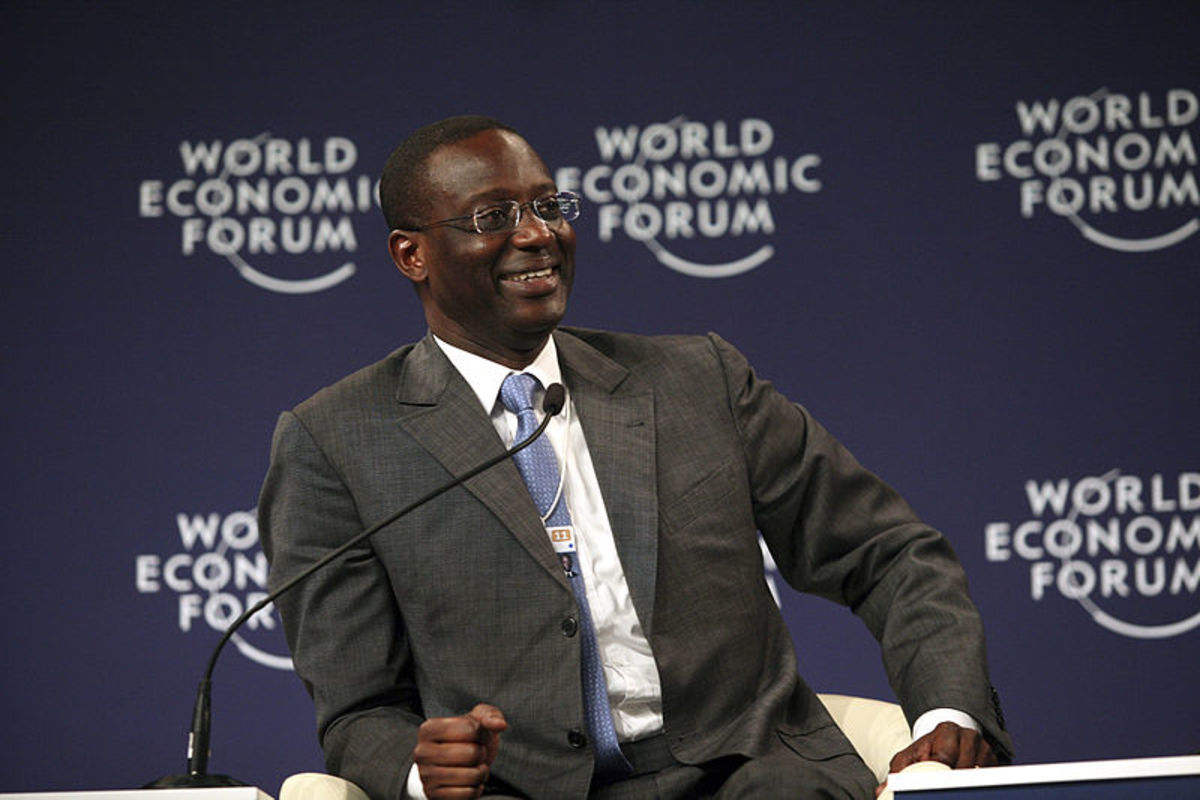Mary Chiwenga, wife of former Zimbabwean Defence Force commander General Constantino Chiwenga. (Photo: Getty Images / Dan Kitwood) Less
In a country where pensioners spend four nights sleeping outside banks to access less than US$5/day, Mary Chiwenga, the wife of Zimbabwe’s vice president, is accused of having ‘externalised’ US$1m to SA and China.
In the past two years, the lives of the poor and working people in Zimbabwe have not improved an iota. A high-profile criminal prosecution of Mary Chiwenga, wife of the vice president, tells us a lot about the spending habits of Zimbabwe’s political elite. Meanwhile, if you walk through any major town in Zimbabwe at night, you will find dozens of people sleeping on the pavements. If you observe carefully, you will notice that many are found outside banking halls. Why and what’s really going on?
Suffer the pensioners
Zimbabwe has been experiencing cash shortages for years. As a result, most urban dwellers now transact electronically using the EcoCash cellphone banking platform or swipe their bank cards. Unfortunately, many people, especially pensioners, most of whom relocated to the rural areas after leaving their jobs, still depend on hard cash to live.
Banks do give cash, but in limited supply – if one is lucky, you can get up to Z$50 a day. That is exactly R50. On 20 November 2019, the state-run newspaper, The Herald, ran a headline that screamed: NSSA increases pension payouts. The National Social Security Authority (NSSA) is the Zimbabwean body that manages pensions. The report said:
“The National Social Security Authority (NSSA) has more than doubled its minimum pensions from $80 to $200 a month, while workers’ compensation scheme minimum pensions have been tripled from $80 to $240.”
This may sound hopeful. Who does not want to hear that their salary has been doubled or trebled? But what this means in real terms is that minimum pensioners payouts have been increased from R80 to R200 a month and workers’ compensation trebled from R80 to R240 a month.
With Z$240 in Zimbabwe, one can go and buy exactly 16 loaves of bread (Z$15 each) or 24 cans of Coca-Cola (Z$10 each) or 13l of petrol (Z$18/l) or, since it’s festive season, a bottle of Robertson sweet red wine from OK Zimbabwe, our biggest supermarket chain “where the nation shops and saves”.
This is what people who saved their pensions with the NSSA get monthly. But this money, at a Z$50 withdrawal a day, can only be withdrawn over four days, if one is lucky. So, because they cannot afford to get into town for four days in a row, many pensioners have no choice but to sleep in the bank queues right outside the bank for at least four days a month.
It is unconscionable what the government is doing to pensioners. NSSA pensions are decided after consultation with Finance Minister Mthuli Ncube. The Z$80 pensioners’ salaries were originally US dollar salaries. With the coming of the bond note, they were pegged at a rate of 1:1 against the US dollar. But on 20 February 2019, Reserve Bank Governor John Mangudya decided to change the local currency to what he named the RTGS dollar and its rate against the USD was to be determined by the markets.
They, however, did not adjust salaries to the new rate.
What this means is according to today’s rates of US$1: RTGS20, a pensioner earning Z$200 should in fact be earning RTGS4,000 or R4,000. The government, through the Reserve Bank, came up with a policy that changed the currency, but did not adjust people’s bank balances and salaries in line with the new rates. This is criminal.
Squander the rich
As this injustice is occurring, the trial of Priscah Mupfumira, a former tourism minister, who was arrested on 25 July 2019 over the US$95-million NSSA scandal has been postponed after she was declared “too depressed” to stand trial.
How depressed are her victims, one wonders.
Now, in a country where pensioners spend four nights sleeping outside banks to access less than US$5/day, Mary Chiwenga, the wife of Zimbabwe’s Vice President Constantine Chiwenga, is accused of having externalised US$1-million to South Africa and China.
Everything about this case stinks.
It is a cocktail of corruption, misogyny and abuse of office. Mary Chiwenga’s husband is accusing her of all these crimes, and that husband is the vice president. He has managed to get the Zimbabwe Anti-Corruption Commission (ZACC) embroiled in his marital issues, showing us the extent to which institutions in Zimbabwe are under the influence of politicians. Not only did the vice president manage to get the ZAAC to investigate his wife, he also got the police to arrest and detain her, and who is to say it was not him that ordered the magistrate to remand her in custody?
This is a clear case of abuse of authority. Where does this influence over the judiciary, armed forces and other state institutions start and where does it end?
Let’s be clear, Mary Chiwenga is no angel. In 2018, she sent someone to “talk to me” about my social media posts which she felt painted her and Zanu-PF in a bad light. She advised me to stand down and rather take it from her than have the soldiers pay me a visit.
I refused to be intimidated. A short while later I was fired without warning from my job at a government-funded publishing house.
I admit I step on many government toes with my writing, but I will forever wonder to what extent her threats were linked to my firing. Mary Chiwenga failed to manage the power that came with being married to an army general cum vice president. Many do not feel sorry for her for what is happening, but for the sake of justice and constitutionality, we cannot condone what the vice president is doing to his wife.
The nature of the allegations against Mary Chiwenga tells a story of a family that had access to millions of dollars. Mary Chiwenga is accused of externalising US$1-million. Where on Earth did a civil servant’s wife get US$1-million? How much do vice presidents earn that they could have access to that kind of money? How much did Constantine Chiwenga earn as an army general?
Pictures of the Chiwengas’ mansion did the rounds on social media after the overthrow of Robert Mugabe, exposing just how rich the general must be. If ZACC was truly in the business of investigating corruption, would it not have gone further than arresting Mary Chiwenga and dug deeper into the source of the US$1-million? Do the Chiwengas’ earnings justify their wealth?
Let us look at how Mary Chiwenga is said to have externalised the money. Had she smuggled the money to South Africa stuffed in suitcases we wouldn’t bat an eyelid, we would think she is just another common criminal. What is shocking is that Mary Chiwenga is accused of having externalised this money through formal channels. She waltzed into CBZ bank, past pensioners and others who had probably been in the queue for days, and somehow managed to get the bank to transfer hundreds of thousands of US dollars to banks outside Zimbabwe. This is enraging to many Zimbabweans whose US dollar bank balances were changed overnight to a worthless local currency.
The fact that Mary Chiwenga could get a Zimbabwean bank to transfer up to a million US dollars outside Zimbabwe is shocking and triggering to many of us who have failed over the years to get foreign transfers of humble amounts processed.
Tobacco farmers, whose products are sold in forex, are wallowing in poverty because they are paid in local currency by the government as forex is said to be directed to priority imports. What priority imports did Mary Chiwenga buy with her US$1-million? Is the government prejudicing tobacco farmers of their hard-earned cash to fund their own lavish lifestyles?
On the invoices that Mary Chiwenga is said to have produced to the bank, there was tents and chairs as well as prepaid electricity meters. What did she tell the bank the tents and chairs were for, for them to authorise the release of hundreds of thousands of dollars of scarce foreign currency? Why was Mary Chiwenga purporting to import electricity meters? Is she the one supplying them to the Zimbabwe Electricity Transmission and Distribution Company (ZETDC)? On what grounds would she be doing that?
What the externalisation and money laundering charges have exposed is nothing short of organised crime. For Mary Chiwenga to do this she had to get authority and thus collusion from CBZ bank which had to get authority and thus collusion from the Reserve Bank of Zimbabwe (RBZ). Why are they not charged or at least being investigated for facilitating this crime?
Is Constantine Chiwenga, the complainant in this case, not the one who paved the way for Mary Chiwenga to have access to this syndicate that allows government officials to transfer such large amounts of money outside Zimbabwe?
How many others have this kind of access to state coffers? Just this week, Emmerson Mnangagwa Junior, son of President Mnangagwa, is said to have bought his girlfriend Pokello Nare, former Big Brother Africa housemate and stepdaughter of Ignatious Chombo, a Range Rover 2020 worth at least US$70,000. How did the president’s son manage to accumulate that much forex? Where is he based? If in Zimbabwe how did he get the money out of the country? What is his source of income?
This is not the first time CBZ bank has been found to have facilitated transfers of forex for government officials or their spouses. In 2016, it facilitated the botched purchase of a US$1.4-million diamond ring that Grace Mugabe reportedly bought for herself on behalf of Robert Mugabe as a 20th wedding anniversary gift. The same CBZ bank that was assisting government officials to externalise money in the Robert Mugabe era is today seemingly doing the same for Mnangagwa’s government. For its roles in this scandal, is ZACC going to investigate CBZ bank too? Will they investigate the RBZ?
I have been asking myself, since when are externalisation and money laundering punishable offences in Zimbabwe? Back in 2017, soon after the removal of Mugabe, Mnangagwa announced that the shortage of cash in the economy was due to externalisation of funds by certain companies and the new dispensation would investigate these companies and recover the funds. They published a list of accused companies and their directors in 2018 and told them to return the monies or face the law. It has been two years and we are still waiting for either the cash crisis to end if the monies have been repatriated or for trials of offenders to commence. None of that has happened and clearly, large sums are still being externalised from the country.
So, back to the allegations against Mary Chiwenga.
The complainant, Vice President Chiwenga, claims Mary Chiwenga forged a marriage between the two. Had Mary Chiwenga printed and signed a fake marriage certificate, all on her own, we would think she is just a common criminal. But Mary Chiwenga allegedly has in her possession, a marriage certificate awarded through all the proper channels and with all the necessary signatures. Why is she the only accused? Mary Chiwenga, according to her husband, got a judge and court officials and the Judiciary Services Commission to solemnise a marriage between herself and a bedridden and allegedly unconsenting partner, and none of them is accused alongside her. Is that not targeted and selective use of the law?
Mary Chiwenga is also accused of attempting to murder the general while he was critically ill. It is said there are witnesses to this. Why did the witnesses not report this murder attempt when it occurred? Are the South African authorities in possession of such a report? Why would the witnesses wait to report this crime to the victim and not the authorities? Had the victim actually died, would they have ever reported this crime? This seems like either trumped-up charges or a murder attempt and cover-up gone wrong. If there was a cover-up, should Mary Chiwenga not be in jail with her accomplices?
By getting his wife thrown in jail, the vice president has exposed not only his corrupt nature, his influence over our institutions and abuse of power, he has also exposed the misogyny many would like to believe does not exist. Many women in Zimbabwe find themselves destitute when relationships with their husbands and boyfriends turn sour. From revenge pornography which involves the publishing of a partners’ nude pictures and sex tapes, to banishing from homes to stripping them of their access to finance; women are exposed to all forms of abuse when relationships collapse.
This is not Chiwenga’s first messy divorce.
When Vice President Chiwenga divorced his first wife, Jocelyn, she claimed 20 soldiers from the presidential guard were sent to evict her from her farm. As if that were not enough, she said soldiers were sent to forcibly evict her from their home. The divorce case went on under a media blackout. While many felt sorry for Jocelyn, several felt she was getting a taste of her own medicine as she too, was as tyrannous as Mary Chiwenga while she was married to the vice president, then still just an army general. Jocelyn is best known for attacking Morgan Tsvangirai in a supermarket.
Just as Chiwenga managed to evict Jocelyn from their home without a court order, and get a divorce order in the absence of her lawyers, he has now managed, using the same courts, to get his wife thrown into prison. What kind of person treats women like this? What kind of person gets the mother of his three young children arrested and humiliated like this? Surely, most people would want, for the sake of their children at least, to keep this as out of the public eye as possible, but not our vice president.
We are led by people who have no respect for their loved ones. People who even in their personal lives use the law to punish those who cross them. If Chiwenga can use the country’s highest institutions and courts against his wife, is there any hope for us when we stand up to him for his corrupt and misogynistic ways? MC
Thandekile Moyo is a writer and human rights defender from Zimbabwe. For the past four years, she has been using print, digital and social media (Twitter: @mamoxn) to expose human rights abuses, bad governance and corruption. Moyo holds an Honours degree in Geography and Environmental Studies from the Midlands State University in Zimbabwe.
 John Balestriere is an entrepreneurial trial lawyer who founded his firm after working as a prosecutor and litigator at a small firm. He is a partner at trial and investigations law firm Balestriere Fariello in New York, where he and his colleagues represent domestic and international clients in litigation, arbitration, appeals, and investigations. You can reach him by email at john.g.balestriere@balestrierefariello.com.
John Balestriere is an entrepreneurial trial lawyer who founded his firm after working as a prosecutor and litigator at a small firm. He is a partner at trial and investigations law firm Balestriere Fariello in New York, where he and his colleagues represent domestic and international clients in litigation, arbitration, appeals, and investigations. You can reach him by email at john.g.balestriere@balestrierefariello.com.




 Former Acting SG and current Hogan Lovells litigator Neal Katyal (with Sam Koppelman) just released
Former Acting SG and current Hogan Lovells litigator Neal Katyal (with Sam Koppelman) just released  RBG has gotten the
RBG has gotten the  Looking for a diversion from billable hours?
Looking for a diversion from billable hours? This
This 
 Is a lawyer having a good day or a bad day? This
Is a lawyer having a good day or a bad day? This 
 And then there are Funko Pops. You know, those big head toys that seem to be everywhere these days. They even make
And then there are Funko Pops. You know, those big head toys that seem to be everywhere these days. They even make  Lawyers may not have a lot of free time, but when they have a chance to catch up with the world, they can thank you for providing them something fantastic for their viewing pleasure.
Lawyers may not have a lot of free time, but when they have a chance to catch up with the world, they can thank you for providing them something fantastic for their viewing pleasure. There was a
There was a 









 Kathryn Rubino is a Senior Editor at Above the Law, and host of
Kathryn Rubino is a Senior Editor at Above the Law, and host of 


 Jordan Rothman is a partner of
Jordan Rothman is a partner of 
